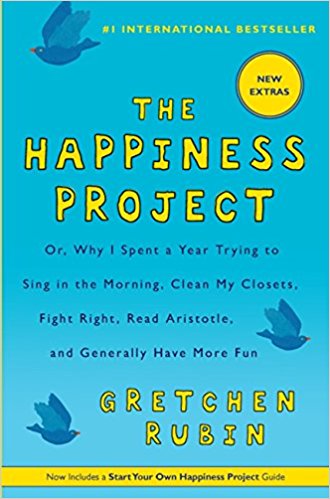I first discovered Gretchen Rubin through a magazine article she wrote that included her genius “one-minute rule:” if you can do something in one minute, do it now. Hang up your jacket instead of leaving it on a chair; throw out your junk mail instead of throwing it on the table; respond to that email instead of leaving it for later. Her book, The Happiness Project, is a lot more wide-ranging and interesting than this household tip, but that’s what first intrigued me.

Rubin decided to spend a year reading every book about happiness that she could get her hands on, and trying almost every tip she found. Her goal was not to go on some grand Eat Pray Love-type adventure, but to find ways to make her current life happier. The result is kind of a cross between a memoir and a self-help book; some of it is relevant only to her, and some of it is startlingly insightful and universal. She’s a great writer, too; the book flies by.
I loved her point about expanding your identity through searching for more ways to feel happy and fulfilled:
One reason that challenge brings happiness is that it allows you to expand your self-definition. You become larger. Suddenly you can do yoga or make homemade beer or speak a decent amount of Spanish. Research shows that the more elements make up your identity, the less threatening it is when any one element is threatened. Losing your job might be a blow to your self-esteem, but the fact that you lead your local alumni association gives you a comforting source of self-respect.
After I had my first child, I felt like I lost my identity in a lot of ways, and gained the new and unfamiliar identity of motherhood. It took me many years to reconcile the two. I think this book would have helped. Rubin does a wonderful job of navigating the guilt and assumptions that keep you from trying things that make you happy, or stopping things that make you unhappy. She realized that
just because something was fun for someone else didn’t mean it was fun for me–and vice versa….I tended to overrate the fun activities that I didn’t do and underrate my own inclinations. I felt like the things that other people enjoyed were more valuable, or more cultured…more, well, legitimate.
There’s such great freedom in allowing yourself to do something you like, just because you like it. (And it’s heartening to hear that even Gretchen Rubin, an accomplished lawyer and bestselling author, worries that her pursuits are not legitimate enough! Self-doubt strikes everyone.)
Because of this book, I started doing light reading again. I gave myself permission to read things just for fun, and not only things that were edifying or “important.” Rubin includes her a great quote from C.S. Lewis:
When I was ten, I read fairy tales in secret and would have been ashamed if I had been found doing so. Now that I am fifty, I read them openly. When I became a man I put away childish things, including of the fear of childishness and the desire to be very grown up.
Rubin is secular, but she was also fascinated by the life of St. Therese of Lisieux–not just by her “little way,” but by the way she always appeared happy and cheerful, even when she was going through interior suffering. Rubin distills this into one of her major rules: “act like you want to feel.” She noticed that St. Therese didn’t just make herself act happy; she made herself be happy. It’s not easy, and it’s not fun (not at the beginning, anyway), but it works.
(Please note here that Rubin is not talking about people with depression; she’s only talking about people who want to live their best life. A lot of her tips are actually quite helpful for depression, but if you’re depressed you may find many of the suggestions in this book inadequate and irritating.)
This book is uneven. Her discoveries about gaining more energy, cultivating habits of gratefulness and cheerfulness, and discerning what really makes you happy are valuable. Her chapters on money and meditation are particularly vague and muddled. Overall, this wasn’t just an interesting read; it changed my life for the better. I’m excited to read her next book, Happier at Home. I’ll let you know when I’m done!





